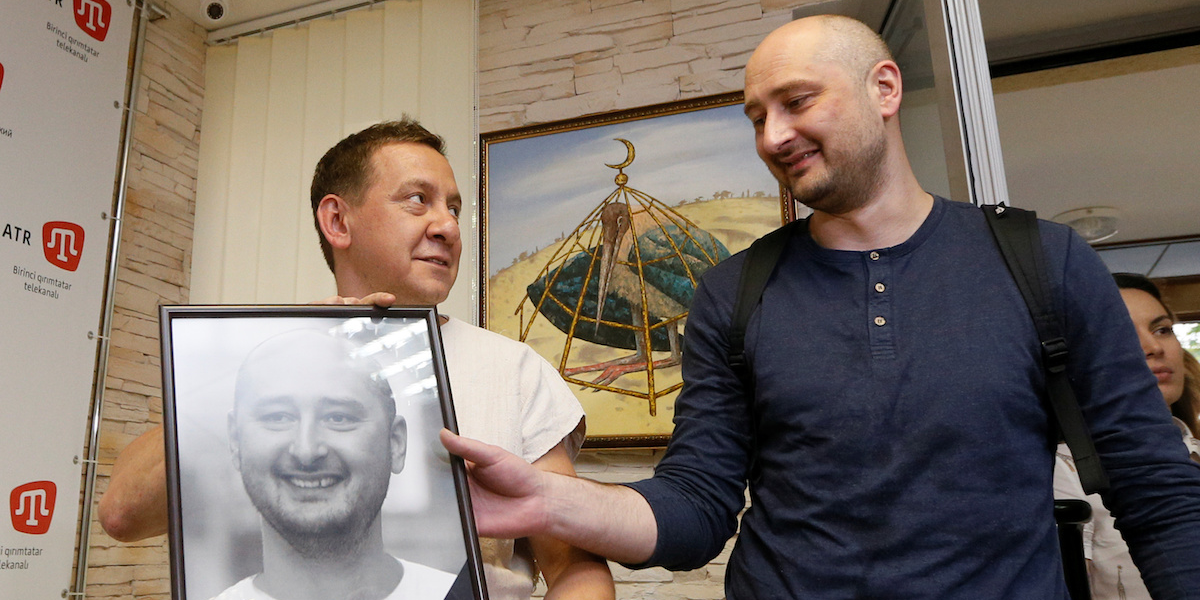- Arkady Babchenko faked his own death in May, after he was told he was on the hit-list of a weapons manufacturer linked to pro-Russian forces in Ukraine.
- The weapons manufacturer, Borys Herman, reportedly hired a former Orthodox priest to carry out the murder.
- But the priest swapped allegiance, and confessed toUkraine’s security service, according to the BBC.
- Babchenko told the flagship “Panorama” documentary the wild details of the ploy.
- It appears that his wife, Olga, was also part of the plan, and lied to the world for the 20 hours that everyone thought he was dead.
- Critics have condemned Ukraine for faking the murder, saying that nobody will ever trust them again.
Arkady Babchenko, the anti-Putin journalist who faked his death earlier this year, has described the incredible lengths to which he went to cover up his fake assassination.
Arkady Babchenko, who fled Russia last year due to threats made against him and his family, grabbed international attention in late May when Ukrainian police announced that he had been shot dead at his apartment in Kiev.
But in a wild turn of events, Babchenko turned up alive at a press conference the next day to say that he was alive.
He later described to the BBC’s flagship “Panorama” documentary show being given a shirt prep-pared with bullet holes, being taught to fall like he’d been shot, and having pig’s blood poured on him so Ukrainian officials could fake photos of his assassination.
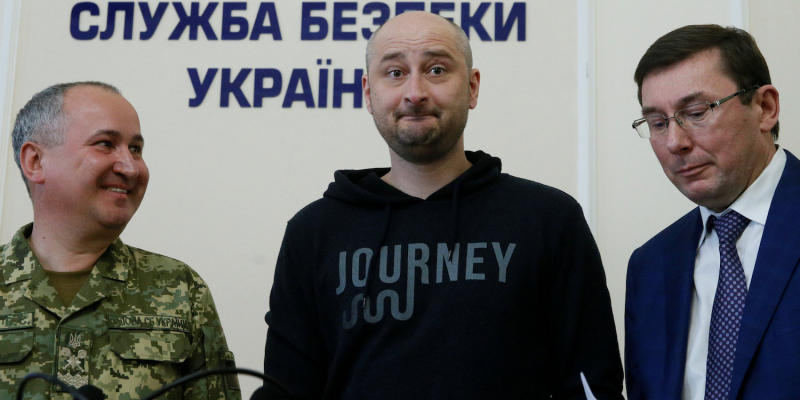
According the investigation, published in part here on the BBC's site, a weapons manufacturer from eastern Ukraine had enlisted a former Orthodox priest to assassinate Babchenko because he was one of many people "working against Ukraine."
The weapons manufacturer, Borys Herman, had been known to Ukraine's security service, the SBU, as an alleged conduit of funds for pro-Russian military ventures in eastern Ukraine.
Anti-government groups have been fighting pro-Russian forces in the country's eastern Donbass region since 2014.
Oleksiy Tsymbaliuk, the priest whom Herman hired to kill Babchenko, told the BBC: "He [Herman] told me that there was a hit list, and that there were people willing to finance this being carried out - and would I be interested in the job. I of course agreed. ...
"If you refuse a request like this - you probably end up dead."
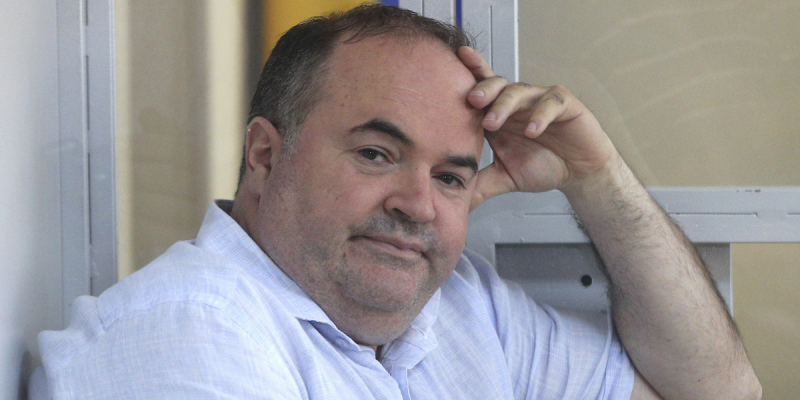
Herman had agreed to Tsymbaliuk's price of $30,000 (£22,600) and Herman said he would add an extra $10,000 (£7,500) "to pay for his beers," Tsymbaliuk said.
But instead of carrying out Herman's wishes, Tsymbaliuk decided to alert the SBU, according to the BBC.
The SBU then told Babchenko they would help fake his assassination in order to catch Herman and his hit-list.
Babchenko then told his wife, Olga, of the plan. While Olga "wanted to escape, to hide, to grab my husband and child and just run far away," according to the BBC, Babchenko reportedly told her: "We will catch these reptiles."
It was previously believed that Olga, who found his body and called the ambulance, had no idea that the assassination was fake, as Babchenko apologized to his wife at the press conference where he revealed that he was actually still alive.
"The make-up people did a great job"
On May 29, Babchenko had a make-up artist do up his face to simulate an attack. He was also given a shirt with bullet holes, and shown how to fall as if he'd been shot.
Babchenko told the BBC:
"We had a make-up person who put shadows on my face, as if I'd lost lots of blood. My lips were smeared. Then they poured pigs blood into my mouth.
"Then, when I pretended to be shot, I fell to my knees and coughed a little to make the blood splatter. The make-up person put a blood clot in my nose with the words: 'Sorry, but we have to do this.'
"I said: 'Carry on - this is your work. This is your job, mine is to lie here.'"
Watch Babchenko and the BBC reconstruct the "murder" here:
The Russian journalist Arkady Babchenko was declared murdered in May.
But a day later, he appeared at a press conference alive.
Here's how he staged his death.
Watch the @BBCOurWorld investigation for @BBCPanorama, The Fake Murder That Fooled the World, on @BBCOne at 8:30pm. pic.twitter.com/6Vs59UaZYA
— BBC Panorama (@BBCPanorama) July 23, 2018
Tsymbaliuk, the "assassin," added:
"What did I see when I opened the door? I saw a man in a pool of blood. Everything looked very real. The make-up people did a great job.
"For a moment I thought: 'If this was real it would be awful.' I wished him good health."
In response, Babchenko said: "Don't make me laugh because I've been killed. It will crack the blood that has dried."
This is the photo the SBU released upon Babchenko's "death":
https://twitter.com/Antikaratel/status/1001851288987095042?ref_src=twsrc%5Etfw
Meanwhile, Olga said she was concentrating on how she should act when she had to pretend to find the body and call the ambulance.
Paramedics, who were briefed on the matter, then pretended to treat Babchenko before taking him to the morgue. Officially, the story went at the time, medics tried and failed to resuscitate the journalist, and a doctor established his death,
Babchenko pretended to be dead until he was taken to the morgue, after which he sat up, smoked a cigarette, and watched rolling news coverage of his own death, which was reported as fact by major outlets around the world.
"It was the strangest two to three hours of my life," the journalist told the BBC. "I was sitting in the morgue wrapped in a sheet like Gandhi.
"I was smoking and watching TV news about what a wonderful guy I was. Next door, a pathologist was sawing a skull, performing an autopsy."
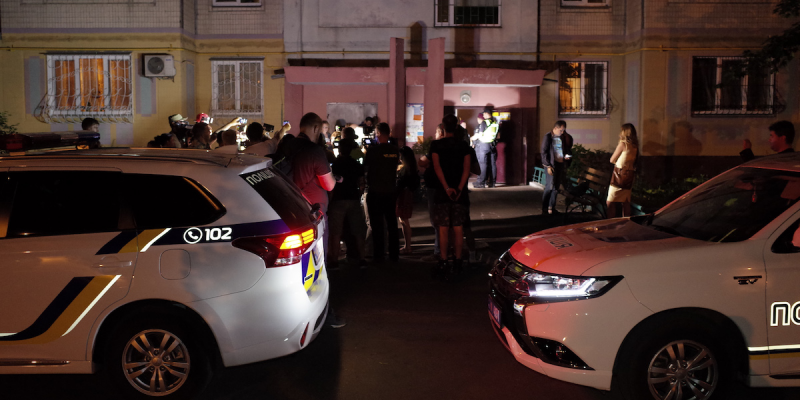
The "hardest part" was not being able to tell their friend
The "hardest part" of the entire operation was not being able to tell his close friend, Aider Muzhdabaev, about the death, and hear him cry, Olga said.
Muzhdabaev, a former Russian exile like the Babchenkos, was an old friend of the couple and had offered Babchenko a job at his Crimean TV channel, ATR.
Olga said:
"Aider arrived [to the crime scene] first. It hurts to remember how he wept like a child whose mother had just been killed in front of them.
"I've never seen a man cry so much before. He just howled.
"I wanted to tell them everything. But I knew I couldn't. This was the hardest part of the whole operation."
Watch Babchenko's colleagues at ATR go wild when Babchenko revealed that he was alive at the press conference:
Реакція журналістів ATR 😍
Відео - Kateryna Lisunova pic.twitter.com/GmkBcXc157
— Радіо Свобода (@radiosvoboda) May 30, 2018
Why Babchenko came back to life a day later
A day after the "murder," Tsymbaliuk asked Herman for his money, but said Herman delayed their meeting until the next day because he was too hungover.
The SBU were going to wait at first, but because there was too much media attention on Babchenko's death, the security service arrested him immediately.
Herman's arrest led to the discovery of a hit-list of 47 people whom Russia wanted to kill abroad, the SBU claims. The full list of the names on the hit-list, allegedly taken from Herman's phone after the faked death, remains a secret.
Herman has since claimed that he, too, was working for the SBU to secure the hit-list, and that he chose Tsymbaliuk as the assassin because he was a priest, and therefore couldn't kill anyone.
There has been no public evidence so far which supports Herman's claim.
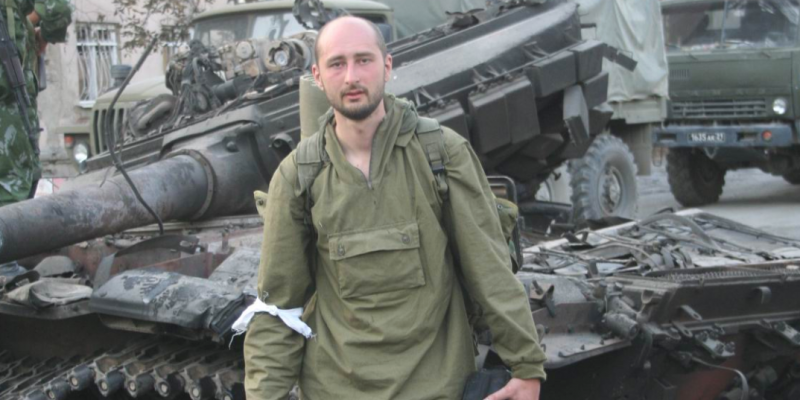
Critics have slammed the SBU for faking the assassination, saying that it will undermine future news about threats facing journalists, and make people hesitate before trusting Ukraine again.
Christophe Deloire, the secretary-general of Reporters Without Borders said at the time: "It was distressing and regrettable that the Security Service of Ukraine played with the truth. Was such a scheme really necessary? There can be no grounds for faking a journalist's death."
Lindsey Hilsum, an editor at Channel 4, also tweeted: "So now every time a journalist is murdered, those responsible will unleash their bots and propagandists to say it's fake news. Thanks, Ukrainian security services. That's really helpful to all who care about journalists' safety."
Even Sonia Koshkin, a journalist whose name was among the 47 on the hit-list, has refused to believe the SBU and said the hit-list is fake.
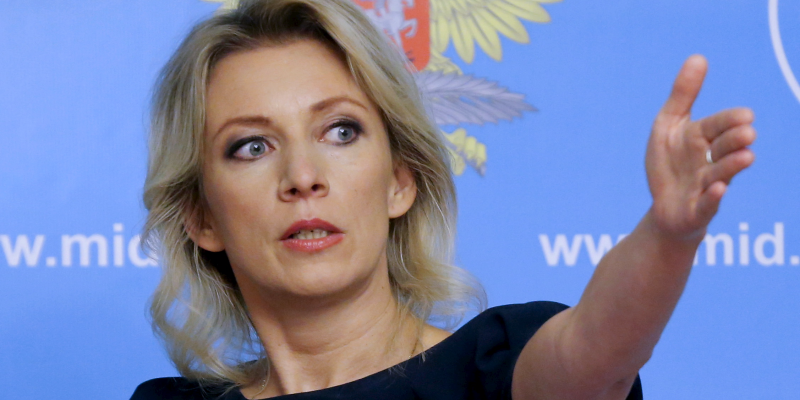
Maria Zakharova, the Russian foreign ministry spokeswoman, said: "Did they [SBU] realise what they did? Because nobody will trust the Ukrainians and Ukrainian government any more in any sort of future cases.
"What was the goal of the people who invented ... this story, I don't know. That was too silly, that was really stupid."
Zakharova also denied Russia's involvement in the hit-list.
Meanwhile Vasyl Hrytsak, the head of the SBU, told the BBC: "We were told that there were several units in Ukraine and that this assassination is just a test run for others. Only by staging this crime, could we get the list of targets.
"We had to know more about who was involved in preparing and commissioning this terrible crime."

